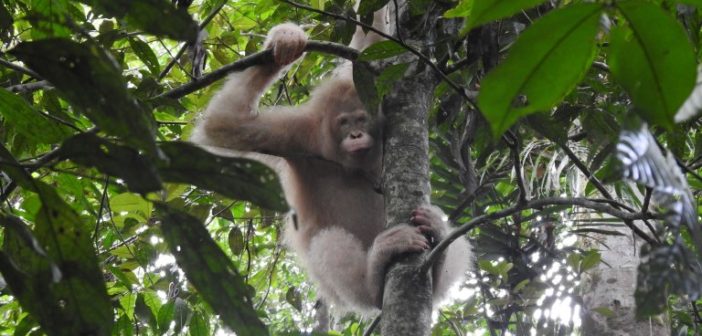A Bornean orangutan named Alba, who is believed to be the only albino orangutan alive in the world, is thriving in the rainforest where she was released more than a year ago.
A monitoring team was checking on three other rehabilitated orangutans who were released recently in the Bukit Baka Bukit Raya National Park (TNBBBR) in Indonesia’s Central Kalimantan province when they spotted Alba.
The CEO of the Borneo Orangutan Survival Foundation (BOSF), Jamartin Sihite, said: “While monitoring Unyu, one of the newly released orangutans, the team looked on as he encountered Alba.
“Their immediate greeting served as a heart-warming reminder that, during her time at the BOS Foundation’s Nyaru Menteng rehabilitation centre, Alba had been housed together with Unyu.”
Unyu, who is six years old, was released along with a 17-year-old male named Batola and a 12-year-old female named Paduran.
Alba was released back into the wild in December 2018 along with another female orangutan, Kika, with whom she had forged a special bond.
Alba was rescued in April 2017 by the BOSF and the Central Kalimantan Natural Resources Conservation Agency (BKSDA).
She was five years old and had been held captive for two days by local residents in the village of Tanggirang in the Kapuas Hulu sub-district of the Kapuas Regency. She still displayed wild behavior when confiscated.
“She was stressed, dehydrated, weak, suffering from a parasite infection, and displaying a poor appetite,” Sihite said at the time.
Alba spent nearly two years in Nyaru Menteng before she was released back into the wild.
On arrival, she was cared for around the clock by a veterinary team. “Because of her sensitivity to sunlight, she was kept in a dimly lit, enclosed quarantine facility,” Sihite explained.
Alba gradually started to accept more varied foods, and milk, and her physical condition significantly improved.
The most recent orangutan release was the 21st release of rehabilitated orangutans in the national park since August 2016, and the 35th conducted in the province of Central Kalimantan since 2012.
Since 2016, a total of 171 orangutans have been released in the area, including three who were translocated from places where there was human-orangutan conflict.
The BOSF has also released orangutans in a second site in Central Kalimantan, the Bukit Batikap Protection Forest. A total of 468 orangutans have been released in the two Central Kalimantan forests since 2012, and one has been released in the Kehje Sewen Forest in East Kalimantan.
Since 2012, 20 orangutans have been born in the wild at the three release sites.
The head of the National Park Authority, Agung Nugroho, said he had received reports that Alba was capable of extensive exploration, skilful foraging, and deft nest building.
“She also socializes with other released orangutans within the national park,” Nugroho said. “This is truly positive. We all hope that Alba continues to survive in this forest, and live wild.”
Sihite said that, from Alba’s release to the end of 2019, observations showed that, on average, she spent 56.5 percent of her active hours in the forest feeding, 27.2 percent of her time traveling, 13.8 percent of her time resting, and 2.2 percent of her time engaged in other behavior such as nesting and social interaction.
He added that the monitoring team would continue to observe her regularly for the foreseeable future.
“In addition, the other released orangutans will also be observed through regular patrols and monitoring to ensure that they can survive in the wild without human assistance,” Sihite said.
In 2016, the International Union for Conservation of Nature (IUCN) changed the classification of the Bornean orangutan (Pongo pygmaeus) from endangered to critically endangered, citing the main causes of its population decline as habitat loss and fragmentation, primarily for logging and oil palm plantations, along with illegal hunting and fires.
This is an extract from Annette Gartland’s article on Changing Times. Please click here to read the full text.
Featured image: Alba spotted in February this year. Image © BOSF 2020 / Indrayana.





